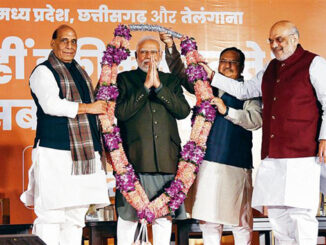
NEW YORK (TIP): Fourteen year old Karan Menon, who won the National Geographic Bee, will join the India Day Parade in New York City, on August 16. Menon, a resident of Edison, New Jersey, will be on the float of the Indus American Bank, the Indian American Community bank which supports all right causes of the community. A large display on one side of the float will have his photograph with clear markings of his award.
He and his family will also attend the India Day Banquet at the Royal Albert’s Palace, Fords, New Jersey on the 17th, as the bank’s guest, where he will be honored by the bank and the Federation of India Associations-Tri State (FIA), the organizer of the parade.
“We are pleased to honor the young man, who has made our community proud. It is a tradition of the IAB to support the youngsters to come up in their career. Menon hails from the same area where the bank has its headquarters and it is natural that we honor him,” Anil Bansal, Executive Chairman & Founder of the bank, said.
“We are very much honored to be invited to the parade. We thank the Indus American Bank for the initiative,” Rakesh Menon, father of Karan Menon said. It will be the first time the family attends the parade. He said they will miss the parade on Oak Tree Road in Edison, as they are going for a vacation to China and return only a day before the New York Parade.
Karan is an eighth grader at the John Adams Middle School in Edison, New Jersey answered all seven championship-round questions correctly to win the title. The final question, which clinched the win for Karan, was: “If completed, the proposed Grand Inga Dam would become the world’s largest hydropower plant. This dam would be built near Inga Falls on which African river?” Answer: “Congo River.”
Karan is the second New Jersey student to win the National Geographic Bee. In 1996, seventh-grader Seyi Fayanju was the national champion.
Fifty-four state and territory winners took part in the preliminary rounds of the 2015 National Geographic Bee on Monday, May 11.
A new addition to this year’s National Geographic Bee was an off-site challenge. The top 10 contestants traveled to the United States Botanic Garden in Washington, DC, where they answered questions covering the geography of plants – including a plant that explodes and another that smells like rotting flesh.
Karan studied for eight hours a day after winning the New Jersey state bee. He also sought out a coach, Kumar Nandur, who worked with winners last year and in 2010.
Typical of all the Indians, the parents sent him to a spelling bee contest as a young boy, but he accidentally got in to the geography bee, reports said. Karan’s parents were taking him to Cherry Hill, New Jersey, for a spelling bee organized by the North South Foundation, when their car broke down. Rakesh got his friend to take Karan and his mother Manisha to the contest. They reached the venue too late, so Manisha asked the organizers if they could allow her son, then about 5, to participate in one of the other contests they had. The organizers agreed, but pointed out that, since Karan was not registered, he could not win a prize.
Karan had not prepared for a geography bee, but came second. After that, despite winning a school spelling bee, and being part of a team that made it to the state level in Math counts, Karan moved to geography.
The family knew about his love for geography, thanks to an interactive globe given to him by a family friend. “It intrigued him and he spent hours on it,” says Rakesh. And when the family put up a map in the basement of their then home, Karan spent still more hours contentedly studying it.
As he grew older, Karan found his way into Wikipedia, whereon he searched up the detailed histories of countries, cities, capitals and presidents.
In the semifinals, Karan faced problems as the right answer he had given was deemed wrong initially. (The question: What metal-bearing mineral is found in the Mesabi Range of Minnesota? The answer: iron ore. Karan answered taconite, the primary kind of iron ore found there, and things were settled in Karan’s favor after he sought a review).
Karan loves math, science and technology but has not decided between a career in science and working for National Geographic, whose offices he found endlessly fascinating.
As the winner, he got a $50,000 college scholarship, a lifetime membership to National Geographic and a trip to the Galapagos.





Be the first to comment